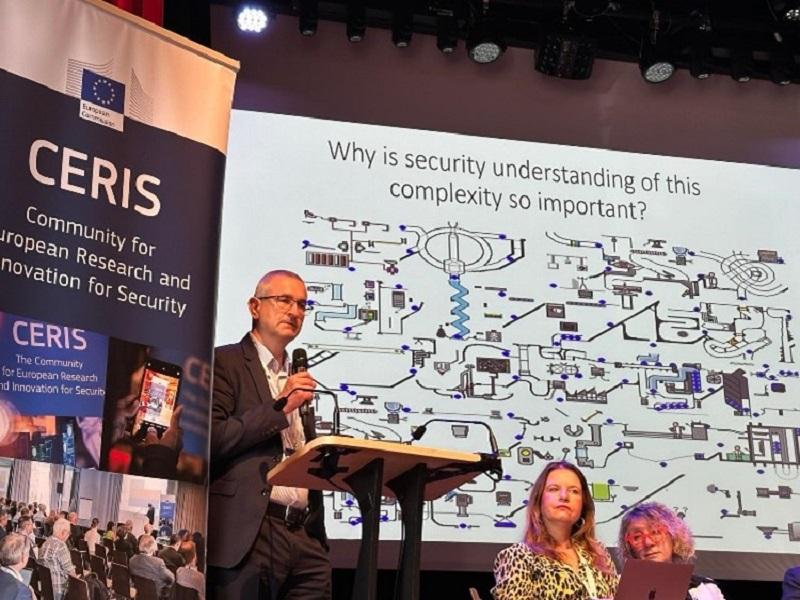
In the framework of CERIS, led-by DG HOME’s Security Research and Innovation Unit, an event on Innovating Smart Cities Resilience through Research and Best Practices gathered 60 policymakers, practitioners, researchers and representatives of academia, industry, and civil society in Brussels on 11 April 2024. Participants discussed innovative measures and strategies to address the pressing need to strengthen the resilience of urban and peri-urban Critical Infrastructures (CI) against complex security challenges, in an increasingly interconnected and technology-driven world. By highlighting security gaps and needs, EU policy priorities, and future scenarios, the event continued the work of CERIS in fostering a collective vision for European resilience.
The objectives of the event were to inform the relevant stakeholders about past and ongoing research projects on critical infrastructure resilience whose results would strengthen future research, to highlight the importance of this topic to EU policy with regards to climate, civil security, and geopolitical trends, to strengthen links between policymakers, practitioners, researchers, academia, industry, and civil society within CERIS and to address outstanding and urgent gaps on Critical Infrastructure Resilience through Research and Innovation. The programme of the event aimed to foster fruitful discussions from many angles of expertise.
The event was opened by Dr Elena Patatouka, presenting the results of pilot project Trikala CCC which was carried out under the EU-funded security research project S4AllCities, in the Greek city of Trikala. This included tools for monitoring and handling multiple risks, such as cyber and physical threats to infrastructures within Trikala or managing crowds during large social events. Dr Patatouka highlighted the need, to train end-users, to identify their needs, capability gaps and legal and ethical aspects, improve the legislative landscape in using new tools such as Unmanned Arial Vehicles (drones) in line with the legal requirements, break down silos between different stakeholders and relevant authorities, and create tools to facilitate city-led scenarios.
Discussions during the event were held in three panels. In the first panel, Foundations of Smart City Resilience, CERIS expert Ivonne Herrera talked about smart city resilience and Frédéric Guyomard (EDF Lab Paris-Saclay) about the importance of digital security. Then, participants had a chance to present and discuss EU-funded projects PRAETORIAN and NBSINFRA. PRAETORIAN’s strategic goal is to increase the security and resilience of European CI and facilitating the coordinated protection of interrelated CI against combined physical and cyber threats. NBSINFRA is a new project, which is advances Nature-basedSolutions (NBS) to safeguard critical urban infrastructure against various hazards.
The second panel addressed the topic of Advanced Resilience Measures for Urban Areas. Corina Pascu presented ENISA’s report on AI and Cybersecurity Research and Cyber Insurance. Tim Stelkens-Kobsch, from the German Aerospace Center, showcased challenges and infrastructure complexity of airports and the relevance of lessons learned to smart city resilience, security weaknesses, limited information sharing between stakeholders, collaboration needs, and blockchain & crypto assets. In the same panel, participants had the chance to find out more about EU-funded project PRECINCT. PRECINCT is the first project focused on understanding cross-sectoral risks and effects in smart-city eco-systems, including for first responders. Another project discussed here is HermesBay’s project DOMINO, which analyses risk factors for networked infrastructure and possible cascading or “domino” effects at national, regional and local level, using cyber impact simulation for operators and decision makers.
In the third panel Urban Planning and Collaborative Strategies, panellists presented the EU-funded projects GATHERINGS, S4AllCities and APPRAISE. S4AllCities aims to increase the resilience of city infrastructure and provide technological solutions for the management of CI. APPRAISE provides a digital twin centric platform for security management, while GATHERINGS provided insights on the ethical considerations necessary in the application of new technologies aimed at monitoring or surveillance. Markus Hedorfer from the European Council of Spatial Planners presented the importance of avoiding emergency situations instead of responding to them. One “new” domain in spatial planning, highlighted by the Russian aggression against Ukraine, is that of resilience in times of war.
The event highlighted to the audience that Smart City Resilience is a multi-domain challenge requiring cross-sectoral cooperation and integration of different systems for better decision-making. While some EU security research projects are working on managing the impacts of cascading effects, participants agreed that more could be done regarding adaptation strategies for cities, with a view to improving the hybrid situational awareness and coordinated response from local authorities.
In the discussions, trust has been identified as a key issue. For instance, infrastructure operators compete for the same sector contracts and therefore can sometimes be reluctant to share information, especially on vulnerabilities and interdependencies. Trust is important when it comes to sharing data, particularly among international stakeholders, as well as at the beginning of a project.
Some of the presentations that were given during the day can also be accessed here:
Keynote by Elena Patatouka on S4AllCities
Panel 1
Ivone Herrera - Smart City Resilience
Frederic Guyomard - Innovating Smart Cities Resilience through Research and Best Practices
Panel 2
Corina Pascu - An update on ENISA's work on Cybersecurity research
Panel 3
Matthias De Backer - GATHERINGS
Details
- Publication date
- 6 May 2024
- Author
- Directorate-General for Migration and Home Affairs
